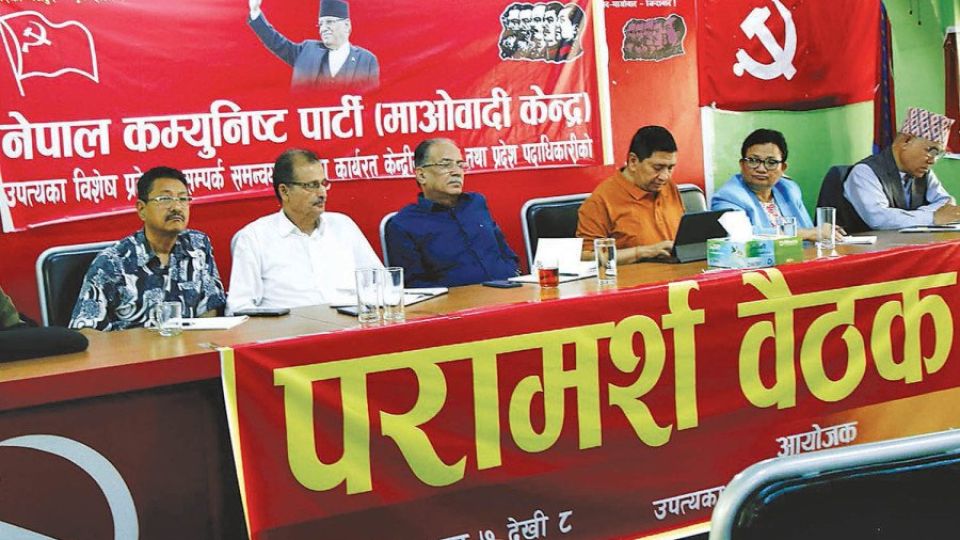October 15, 2024
KATHMANDU – After being ousted from government for the first time in nine years, the CPN (Maoist Centre) appears to be at a turning point as it seeks to redefine its vision of socialism. In the wake of consultative meetings in seven provinces and its foreign units, party leaders have stressed the need for fresh ideas based on the party’s historic Chunwang meeting of 2005 that adopted ‘democratic republicanism’.
Until this July, the party has continuously been in power since the promulgation of the constitution in 2015. Back during the insurgency days, the meeting held at Chunwang in Rukum district had endorsed the party’s political line advocating for promulgating a constitution through a constituent assembly. On this basis, the party in 2006 signed the Comprehensive Peace Accord with the then seven-party alliance and laid down arms to enter mainstream politics.
The 2015 constitution envisions Nepal as a socialism-oriented country, with the Maoist Centre playing a key role in shaping that direction. But why, after all these years, is the party revisiting the question of socialism?
Maoist Centre spokesman, Agni Sapkota, argues that the party has been discussing socialism in various forums. “But this time, we want a more intense and focussed discussion.”
Tensions within the party also came to light during the party’s standing committee meeting in August where office bearers openly questioned the leadership of Pushpa Kamal Dahal. In response, the party decided to hold consultative meetings in all provinces to discuss the matter. Besides the provincial meetings, the party also consulted its foreign branches known as ‘pradesh committees’ in India, West Asia, and Eurasia.
According to Sapkota, the Maoist Centre leadership got three mandates at the consultative meetings that concluded on September 20.
“Besides the need for discussion on party ideology, the consultative meetings’ mandates include improving organisational management and updating party statute, changing leaders’ behaviour, and improving their secretariat work,” Sapkota told the Post.
Likewise, another party leader, Dor Prasad Upadhyaya, says democratic socialism naturally aligns with the ideology of the Nepali Congress, whereas ‘people’s multiparty democracy’ is the ideology of the CPN-UML. “As for the Maoist Center, we lack a distinct political ideology clearly reflecting the party’s vision.”
Although the party claims its ideology is ‘people’s democracy of the 21st century’, party leaders admit that its impact is diluted by lack of commitment.
Party leaders said that there was no call for a leadership change during the consultative meetings. However, at the standing committee meeting in August, a deputy general secretary of the party, Janardan Sharma, submitted a 14-page document calling for a change in party leadership.
Sharma and Barsha Man Pun—another deputy general secretary of the Maoist party—urged Dahal to pass over party reins to new generation leaders.
According to leaders, some within the party feel that Dahal should not leave a leadership vacuum until a clear plan for leadership transition is in place.
Likewise, Ram Karki, the party’s secretary, says the consultative meetings were focussed at preparing a political document that would be presented at the central committee meeting in November.
“The consultative meetings were focused on the party’s diminishing influence in national politics,” Karki told the Post. “Despite our party leaders who were in government claiming that they did an excellent job, why hasn’t that reflected in the party’s life? This was a major concern expressed during the meetings.”
Karki said the meeting also directed the party to remain open for cooperation with other parties with socialist inclinations.
When asked about possible cooperation with the Rastriya Swatantra Party (RSP), Karki dismissed the idea.
“Lately, there have been some points of agreement between the two parties. But, I don’t see any prospect of the two parties getting into a working partnership,” Karki said. “The consultative meetings have said the party leadership is open to cooperation with socialist parties except the RSP.”
The RSP—which was one of the junior partners in the immediate past government led by Maoist Centre chief Dahal before the government was toppled on July 12—appears to be on the same page with the Maoist Centre on many issues lately. But the two parties rule out cooperation on the political front.
Party spokesperson Sapkota also says that his party can cooperate with the RSP in parliament on issues of public interest, but there is no possibility of forging a working alliance with the party.
RSP chair Rabi Lamichhane, who presented his political document at the party’s first national conference held for two days in Kathmandu earlier this month, also hinted at potential cooperation with like-minded parties. Despite this, RSP leaders declined cooperation with the Maoist Centre.
The Maoist Centre’s consultative meetings have suggested that the party consider unification with other parties in order to revitalise the communist movement, Sapkota added.


